“Well I’ve made up my mind, anyway. I want to see mountains again, Gandalf – mountains; and then find somewhere where I can rest. In peace and quiet, without a lot of relatives prying around, and string of confounded visitors hanging on the bell. I might find somewhere where I can finish my book. I have thought of a nice ending for it: and he lived happily ever after to the end of his days.” –Bilbo Baggins, The Lord of The Rings: The Fellowship of The Ring
Violet Evergarden has become renowned as an Auto-Memory Doll of prodigious skill, writing letters for royalty and drafting plays for screenwriters on top of her usual duties. After meeting Leiden’s mayor and his wife, Violet declines an offer to hang out with CH Postal’s staff at a local festival, and instead, returns to her quarters, where she writes a letter addressed to Gilbert. The next day, Violet heads over to the cemetery and pays respects to Gilbert and Dietfried Bougainvillea’s mother – her presence there surprises him, and after Violet drops her ribbon, he hastens to return it. Violet, meanwhile, returns to CH Postal’s office and arrives in time to answer a call from Yuris, a young boy suffering from cachexia. Knowing his time is limited, Yuris requests that Violet write letters to his parents and younger brother, hoping that they’ll continue to live a full life after his passing. Despite her initial surprise, Violet consents to the assignment and pinky-promises Yuris to complete her assignment. However, when Violet learns that Yuris’ refused to see his best friend, Ryuka, she implores him to speak with him in person, but gives him her word that she’ll return to write the final letter for Ryuka, as well. One evening, Claudia and Benedict find a letter in their mail room from Ekarte Island bearing handwriting resembling Gilbert’s. Upon confirming it with Dietfried, Claudia breaks the news to Violet, who becomes conflicted about the possibility of being able to meet Gilbert anew. Despite her worries, Cattleya and Iris assure Violet they’ll be able to hold down the fort back home even as the introduction of the telephone will someday render the Auto-Memory Dolls obsolete – Claudia and Violet thus head to Ekarte Island. Upon arrival, the pair set off for the school where Gilbert is working, and while Claudia tries to convince Gilbert to meet with Violet, he refuses. Violet encounters several of Gilbert’s students and is relieved that he is doing well, but is consumed with sorrow when he declines to meet her. Violet decides that she’s satisfied knowing that Gilbert is well, and prepares to head back home with Claudia. That evening, a rainstorm hits Ekarte, and Violet learns that Yuris’ condition has worsened. Unable to return home to fulfil her promise to him and get a letter written for Ryuka, Violet instead asks Benedict and Iris to step in, but Yuirth’s weakened to the point where even speaking becomes a labouring task for him. In the end, Iris decides to bet the farm on the new-fangled telephone, and in his final moments, allows Yuris to have a conversation with Ryuka, where he apologises to him and thanks him for having been there all this time.
Although Yuris dies, his parents and brother are immensely grateful to learn that Yuris had been happy in his final moments. Back on Ekarte, Violet drafts a letter for Gilbert and asks one of his students to pass it to him. That evening, she prepares to leave as the islanders test out a new cable car Gilbert had devised for transporting grapes. To his surprise, he finds a letter from Violet and comes face-to-face with Dietfried, who apologises for having burdened Gilbert with so much. Dietfried implores Gilbert to live life on his own terms, and that he will bear responsibility for the Bougainvillea name from here on out. Freed from his burden, Gilbert chases after Violet, who’s already boarded her boat, but when Violet hears his shouts, she dives into the ocean and swims ashore. Overwhelmed with emotion and seeing Gilbert for the first time, Violet is unable to form an articulate sentence, and tearfully embraces him instead. Gilbert assures her they’ll be able to be together from here on out. Violet subsequently resigns from her post and lives with Gilbert to the end of her days, while CH Postal becomes merged with another communications company as technology advances. Half a century later, Ann Magnolia’s granddaughter, Daisy, comes across the letters that Violet had written for her and become curious to know more about her story. She travels to Leiden and discovers that CH Postal’s old headquarters is now a museum, and from one of the museum’s curators, a former clerk at CH Postal, Violet ended up moving to an island to find her happiness. Inspired by the powers letters possess, she writes to her parents, thanking them for everything they’d done for her up until now – Daisy had been disappointed that her parents seemed to be more concerned with their occupations than spending time with her, but now, her adventure shows her the importance of taking a step back and appreciating the people closest to oneself. Even though technology has now advanced to the point where voices and thoughts can be transmitted instantaneously, letters remain unmatched for capturing the writers’ emotions, and Daisy’s parents immediately realise that contrary to her words, Daisy still loves them very much, much as how Gilbert and Violet loved one another: they make a pinky promise to always be there for one another. This is Violet Evergarden: The Movie, sequel to 2018’s Violet Evergarden and 2019’s Violet Evergarden Side Story: Eternity and the Auto Memory Doll – the film premièred in September 2020 after several delays, but over its two hour and twenty minute run, Violet Evergarden: The Movie presents a multi-faceted and detailed film that acts as a stunning finale to Violet Evergarden.
Major Themes
From the very first moment Violet was introduced to viewers, her quest had always entailed properly understanding what 愛してる (Hepburn aishiteru) meant. In Japanese, this is the ultimate way of saying “I love you”, a phrase that entails a willingness to wholly commit oneself to another unto eternity. Before he passes out, Gilbert’s words to Violet suggest that he’d come to see her as more than a tool, and even more than a subordinate: she is a peer, a beacon of hope and optimism in a world where everything worth fighting form had seemingly vanished. However, Violet’s own background meant she is unable to comprehend fully what Gilbert had meant. As an Auto-Memory Doll, Violet would come to see other people expressing love for one another, whether it be familial love, love for the irreplaceable bonds that friendship brings with it, or even romantic love. As she begins putting into words these feelings, Violet begins to understand the relationships that different people shared with one another. However, in many cases, Violet finds herself needing to coax these words out of her clients, who struggle to honestly and openly express how they feel. Whether it is a sense of duty, their own honour or a misunderstanding, Violet’s clients each wonder if they deserve the love they’re given. By the events of Violet Evergarden: The Movie, it is Violet and Gilbert who come to this intersection. Violet desperately wants to know that Gilbert is well and ascertain what he’d meant, and now, having seen so much love, Violet begins to wonder if her undying desire to be by his side, to accompany him through the tough times and share happiness together, is what love is. However, Violet also is aware that she’d caused Gilbert no shortage of trouble. On the flipside, Gilbert believes that he should’ve kept Violet off the battlefield so she could pursue beautiful things, and feels himself unfit to meet Violet again. Both Violet and Gilbert second-guess their feelings, trying to convince themselves that it is for the better that they shan’t meet again. However, long-repressed emotions soon overflow after Violet pours her heart into one final letter for Gilbert – letters are a symbol of honesty, and the courage of being able to express what can be very hard to say. In the end, the truth has its day, propelling Gilbert and Violet to meet again, although this time, both are so overcome with emotion that neither are quite able to articulate themselves. Where words fail, silence speaks, and even though their fated meeting was a moment of few words, nothing more needed to be said as Violet and Gilbert share a tender embrace on the shores of a peaceful island far removed from the world’s troubles. In the end, aishiteru is the single most powerful expression of honesty: the courage to be forward about one’s desire to share the future together with someone of great significance and be better together.
In order to have reached this point, however, Violet Evergarden: The Movie shows Violet’s path to Gilbert as being fraught with setbacks and uncertainty. Similarly, Gilbert himself initially expresses a wish not to see Violet, worried that he’d already caused her enough trouble. While it is the case that the two were placed into extraordinary and horrific circumstances from the war, the two are only able to reconcile and set their pasts behind because they are able to forgive themselves. Forgiveness is a core part of Violet Evergarden: The Movie – Yuris’ wish to write letters to his parents and brother to express his gratitude indicates, that however dissatisfied he’d been with his illness and their pitying him, he’s forgiven them. Ryuka forgives Yuris for not wanting them to meet after he’d been hospitalised, citing their friendship together. The villages on Ekarte similarly forgive Leidenschaftlich after the war. Although it is true that Leidenschaftlich resulted in the death of their men, Ekarte’s villagers see for themselves that today, Leidenschaftlich’s citizens are a courteous and civilised people. Instead of hating them, they choose to forgive, holding a memorial every year to commemorate those who had fallen in battle. Violet Evergarden: The Movie shows that how past wounds are healed is through forgiveness: the people of the current generation did not commit the atrocities that their ancestors suffered for, and this acceptance is how longstanding grievances slowly fade away, as former enemies are now recognised as fellow human beings, and even allies. Seeing Gilbert find peace on Ekarte and the sanctuary afforded by their forgiveness is what reassures Violet. Gilbert is doing well, and seeing that her past has no bearing on his future, Violet is able to come to terms with what had happened. Similarly, through Dietfried’s impassioned pleas for Gilbert to seize his future and live life on his terms, Gilbert understands that what’s done is done, and presented with the chance to find happiness with Violet, it’s now or never. Coupled with Violet’s unerring finesse with the written word, both are able to make peace with their past and step forwards together; however tragic the past is, Violet Evergarden: The Movie consistently indicates to viewers that it is never too late to make the most of one’s future. For their troubles, Violet and Gilbert are finally able to move on together, living happily ever after to the end of their days.
Violet Evergarden has never strayed far from presenting the world as unfixed, mutable and ever-changing: the future holds uncertainty, but also possibility, and although one can never be absolutely confident in what unfolds until they take those vital steps forward, the future offers tantalising hints as to what can happen. Violet is presented glimpses of what could happen if she were honest with herself and pursued Gilbert more whole-heartedly, but at the same time, the society around her is ceaselessly marching towards the future. Communications technology becomes ever-advanced, and when the telecom runs cables to CH Postal, giving them a telephone, Iris is initially disgusted that such a contraption could replace something as reliable and ubiquitous as letters. However, she turns around after seeing the telephone connect Yuris and Ryuka together prior to Yuris’ death: the speed at which voices and emotions are conveyed is swifter than that of a letter, and every tone is passed along with flawless accuracy. In order to keep Violet and Claudia appraised of the situation, Benedict and Iris send updates using a telegraph, allowing messages to be sent nearly instantaneously. Leiden has capitalised on the power of faster communication by constructing a massive radio tower at the heart of town, and while Dolls like Iris lament the day they go obsolete, seeing what the new technology is capable of also inspires them to work harder. In the end, CH Postal is bought out by another company and presumably enters the age of electronic communications, attesting to their willingness to adapt. While the world is constantly changing, with tried-and-true methods growing obsolete as up-and-coming technologies supplant them, Violet Evergarden: The Movie indicates that this inevitability isn’t a bad thing, and technology does not so easily sweep away those with the tenacity to learn about it. Moreover, just because a new method displaces an old one does not mean that the former modes are so easily forgotten – Daisy discovers the power of writing through letters, which can endure where digital signals vanish, and upon arriving in Leiden, she finds a museum that faithfully preserves the methods and techniques Violet and her team utilised when letter-writing was still at its height. The past endures, much as how old experiences linger within the mind, but in the end, with the ceaseless march of progress, one’s decisions must always be made to account for the future. CH Postal adopts the new technology while respecting their origins, and while Violet and Gilbert both see tragedy in their lives, they also embrace the fact that there is indeed a future ahead for them, as well.
Remarks on Technical Excellence
Kyoto Animation’s works have long excelled conveying certain emotions, whether it be great joy or great sorrow. A combination of unparalleled facial animations, scene composition, build up and usage of audio-visual cues all contribute to characters taking on a remarkably life-like visage. Violet Evergarden: The Movie, being the culmination of their craft, unsurprisingly manages to take a hold of the viewers’ hearts from the very moment it begins – the story retreads Violet Evergarden‘s most powerful story, about Ann Magnolia and her hiring Violet to write a letter every year to her daughter after she’d learned that she was doomed to die. This single story was particularly moving because it spoke to the perceptible power of emotions given tangible form through letters, and so, acted as a balance against the idea that things in a given society constantly change. Through the use of sight and sound, Kyoto Animation is able to craft a powerful experience by immersing viewers completely into Violet’s world – the way the voice actors and actresses inflect their dialogue, and the choice of incidental music, together with the viewer’s own experiences within the previous instalments allows the film to fully convey the emotional tenour of a given moment. Silence is similarly used to create pauses, allowing viewers to take a moment in. In particular, Violet’s characterisation within the film is noteworthy because of her learnings and discoveries: while she’d previously saw herself as an automaton whose existence was to carry out orders, seeing the full spectrum of emotions had led her to open up and become more human. Violet thus begins to develop more agency by the film’s events – she now makes her own decisions, is able to spot when someone is making a joke and is more expressive. The Violet at the series’ beginning would not have been able to express herself so earnestly as the Violet within the film, and with Violet Evergarden: The Movie, it is clear that the path to “I love you” is a complex one, but above all, a path that asks of those whom tread it, a measure of patience. Violet simply could not have made these discoveries overnight. As such, when viewers enter Violet Evergarden: The Movie having seen all of this, her desire to do what she can for Yuris and meet becomes tangible; the tears are never too far away because the film actively reminds viewers of how far Violet’s come, how the world can take everything back in an instant, but despite this, the human spirit and resolve continue to endure in the choice of words we have for those around us. Between the writing and Evan Call’s excellent music, Violet Evergarden: The Movie creates an immeasurably deep feeling of catharsis, an environment that indicates to viewers that it is okay to be in touch with our emotions, and to cry out our stresses before picking ourselves up and preparing for whatever lies ahead.
Besides their masterful ability to render tangible the emotions within Violet Evergarden: The Movie, Kyoto Animation also excels in the film’s visual presentation. Lighting, timing and spacing are fully utilised to convey what dialogue and sound alone cannot. The fluidity and acuity of facial expressions speak volumes about how Violet and the others feel even where words fail. Attention is paid to every detail, from the glint of light off a typewriter’s keys, to the rippling of water as a torrential rain drenches the island. The diverse colour palette captures the warmth of the lighthouse, excitement at Leiden during a fireworks show, to the cool air of a morning following the storm, giving viewers the sense they are physically present. By this point in time, Kyoto Animation has only managed to surpass their own craft – their films are now comparable to the likes of Studio Ghibli and Makoto Shinkai’s works, which are renowned for their visual quality. The sheer detail in Violet Evergarden: The Movie similarly contributes to the film’s incredible ability to create emotions in the viewers; highly detailed environments and visual clutter can be overwhelming to the mind, resulting in the mind filtering things out to focus on cues within the scene. In this way, the characters’ movements and dialogue, and the emotions behind them, become amplified. It is evident that Violet Evergarden: The Movie capitalises on this fully – although Violet’s world is vividly portrayed, the fact there’s so much in the environment, from books sitting on the shelf to the small reflections on surfaces, means that viewers are naturally inclined to pay full attention to Violet and those she converses with. While anime are often watched purely for the visual spectacle of über-detailed environments and feats of animation alone, clever use of visuals allows a given work to do a lot more with a given scene. The high visual quality typical of Kyoto Animation’s works also serve to enhance immersion in the world and suggest to viewers that whatever world being presented could very much be real. This similarly displaces any disbelief in the mind; if the world is a plausible one, then so are the emotions that the characters experience throughout a given story. The technical excellence in Violet Evergarden: The Movie bring Violet’s story to life in a way that is unparalleled, and as a send-off to a wonderful series, there is no greater praise in saying that Kyoto Animation’s best exceeds expectations, giving the Violet Evergarden series a powerful feeling of closure as Violet and Gilbert manage to move forwards into the future together, having made peace with their pasts.

- An interview with director Taichi Ishidate indicates that Violet Evergarden: The Movie is indeed the finale for the series – while Kyoto Animation’s interpretation of Violet Evergarden was quite different than the original novels, and from what I’ve seen, the adaptation looks like it is superior in every way, focusing in Violet’s story after the war and completely dispensing with the battle axe, Witchcraft, that the novels had featured prominently. The end result is a story that is very moving, and for this, I am very glad to have managed to avoid all spoilers for it.

- Thanks to screenings outside of Japan, a sufficiently large number of people have watched Violet Evergarden: The Movie, and as such, spoilers can be found in all corners of the internet. In spite of this, I was able to avoid all spoilers to have the best possible experience, and having had a look around, I can say confidently that this is the first and only discussion of the film online to come with screenshots. Violet Evergarden: The Movie opens with Daisy, who is quite unhappy that her parents seem more concerned with their work than spending family time with her. When her grandmother, Ann, dies, Daisy comes upon the letters that Clara had requested Violet write on her behalf for her daughter. Realising how much her great-grandmother had loved her grandmother, Daisy becomes intent on learning more about the Auto-Memory Doll, Violet, who’d written the letters.

- Violet Evergarden: The Movie was a film whose journey to the finish line was fraught with challenges – announced back in July 2018, the film’s production was impacted by the arson incident at their studio. Thus, the original première date of January 2020 was pushed back to April, and then the pandemic resulted in the film opening in September 2020. The home release was originally scheduled for this month but has since been delayed to October. Overseas fans hoping for a means of seeing this film have been out of luck so far, but on the plus side, knowing the BD will be available in October means having a concrete date to look forwards to.

- To go any further in this post would constitute spoilers, so folks looking to optimise their experience of Violet Evergarden: The Movie would do well to stop here and close this tab (or perhaps bookmark this post for a later date). I do hope readers have a chance to see this movie for themselves if they’ve not done so; as the finale to Violet Evergarden, Violet Evergarden: The Movie hits all of the right notes. Right out of the gates, the film revisits the story I most enjoyed from the original TV series, and with the tears never too far away, I knew that this film was going to be an emotional powerhouse.

- After the story changes focus from Daisy to Violet, Violet’s composed a hymn that Irma’s set to read as a part of the memorial event marking the end of the great war. By now, Violet’s become a very proficient writer capable of expressing very complex and abstract thoughts in a highly articulate manner. The service is successful, and in the aftermath, Violet receives praise from those around her for having successfully taken on a highly demanding assignment and even has a chance to meet Leiden’s mayor and his wife after the ceremonial reading.
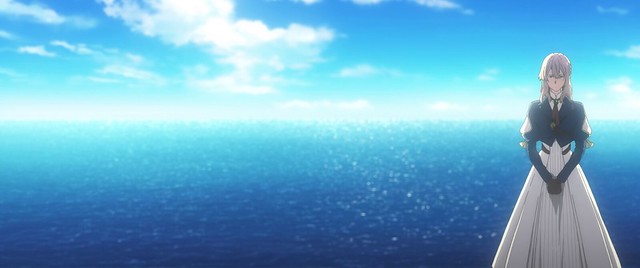
- Even though the war is long over, scars linger, and it is through ceremonies such as these that the sacrifices of the fallen are not forgotten. However, being a survivor of the war, Violet herself is a testament to the fact that people are capable of committing acts of great terror, but in spite of the horrors, people are also capable of regaining their humanity. Indeed, Violet’s terse remarks bring to mind the likes of Halo‘s Master Chief, whose unfamiliarity with civilian convention is offset by a singular desire to protect humanity – while Violet is constantly striving to learn what love is, there are some conventions that she remains unfamiliar with.

- Because of this, Violet herself is very modest and humble to a fault – she expresses that she’s merely the intermediary between the thoughts in a sender’s mind and the words that ultimately are used. Violet’s bluntness comes from a combination of still being unaccustomed to closeness with people she doesn’t know, and she speaks very candidly at times, understating her own achievements.

- This particular aspect of Violet’s character is meant to make her as more endearing to viewers, but also serves to show the intricacies behind Violet. An optimist will view Violet’s modesty as as sign that she’s now familiar enough with emotions and social convention so as to read the mood of a given situation and react accordingly, whereas someone a little more pessimistic might see this as Violet being blunt about her goals: helping others is a consequence of her trying to reach her own objectives.

- At the festival in town, Violet and the rest of CH Postal’s staff meet an aspiring playwright who’s managed to land a job writing at a local theatre. It becomes clear that through their work, CH Postal has left a powerful positive impression on their clients, helping them convey their thoughts in written word. Violet’s first job had been to help the sister of a struggling playwright, and through her words, Violet is able to help convince this playwright to get his game together. Since then, he’s regained his footing and now has people, including the aspiring writer, look up to him, and Violet herself also gained a new friend for her efforts.
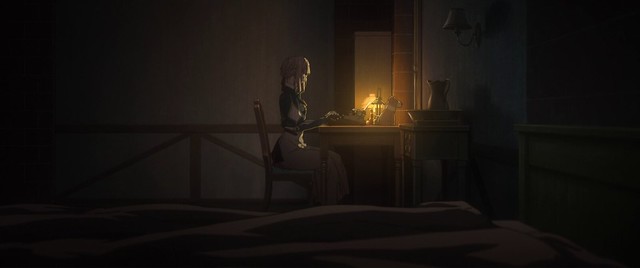
- Every evening, Violet regroups and calms her nerves by typing out letters to Gilbert. Although she writes with the knowledge that the letters will never reach Gilbert, that she continues to do so indicates that he’s always on her mind. While typing one evening, her mechanical fingers jam, and Violet attempts to clear the jam up, allowing Kyoto Animation to really show their craft. Everything in Violet Evergarden: The Movie is beautifully animated, and it speaks volumes to the film’s quality that this is merely one of the many things that Kyoto Animation nailed down in their feature-length presentation.
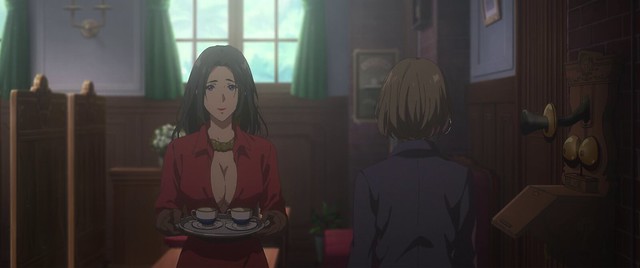
- In keeping with the times, CH Postal’s purchased a brand-spanking-new telephone: Violet Evergarden‘s world also had their equivalent of Alexander Graham Bell, a Scottish inventor who is credited with the world’s first operational telephone in 1876 (although inventor Antonio Meucci had a working phone as early as 1854). The earliest phones needed an operator to change the switches, and they proved somewhat impractical, but by the 20th century, phones had become quite sophisticated; the model that CH Postal uses is a wall-mounted unit, and while it is powerful, Iris considers it a nuisance.

- Both Cattleya and Claudia are aware that the Auto-Memory Doll programme is a dying one: with the ability to instantaneously transmit one’s voice over a wire in real time, the need for letters is lessened. Iris promises to work hard and make the most of her career while the phone is in its infancy – it’s an admirable spirit from her, indicative of someone who is aware her career is headed for its twilight, but nonetheless doesn’t wish to call it quits just yet.

- It turns out that in her spare time, Violet visits the cemetery to pay her respects to Dietfried and Gilbert’s mother – she does so of her own volition. This is significant because Violet previously had little agency, but her experiences throughout the course of Violet Evergarden has allowed her to be more in tune with her own desires and wishes. It’s a very subtle, and clever, way of showing how Violet’s changed as the series progressed. While her words and manner might be that of someone who is utterly dedicated to her craft, Violet’s actions outside of her duties indicate that there are things that she wishes for, even if she doesn’t speak her mind openly to others.

- Violet ends up taking on an assignment from a young boy named Yuris, who is afflicted with a terminal illness. His family clearly loves him, but he’s grown weary of their concern for him and wishes that with the time he has left, they’d treat him normally. To this end, he calls CH Postal with the hope that someone would be able to write letters for him conveying how he feels about everyone, hoping to leave a positive memory behind for his family. While Violet is forced to hide when Yuris’ family unexpectedly shows up, she is able to gain a measure of what Yuris wants.
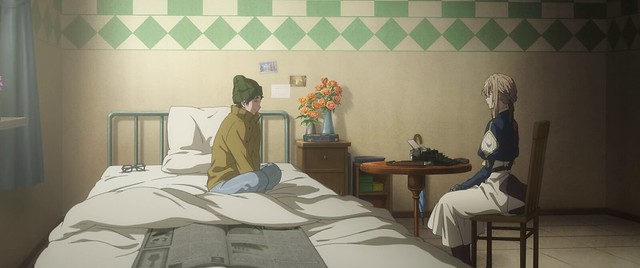
- Speaking to Violet’s own development as a person, when Yuris asks Violet how much the assignment would cost and shows her the funds he’d saved, Violet flatly notes that she’d be able to write a few characters at best, and seeing the shock on Yuris’ face, appends the idea that there’s also a youth discount available: it just so happens he has the precise amount needed. In reality, Violet’s just told her equivalent of a joke here – Violet’s empathy means that she’d been quite prepared to do this assignment for free, and her humour flies over Yuris’ head, once the terms are settled, Violet promises to return and get his letters done.

- Back at CH Postal, Violet is shocked to see Dietfried at the gates – it’s clear he’s not welcome here, from Claudia and Benedict’s reactions. Violet herself immediately makes to subdue Dietfried in an arm lock from muscle memory before catching herself and remembering the war is long over. It turns out Dietfriend had found Violet’s hair ribbon and merely sought to return it to her. In addition, he also has plans to dispose of Gilbert’s old boat, and was thinking that some of Gilbert’s possessions might be of interest to her. Violet immediately accepts the invitation to see Gilbert’s boat.
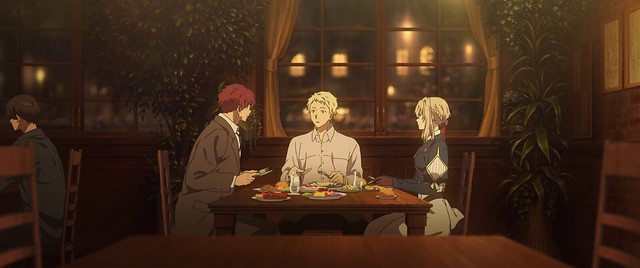
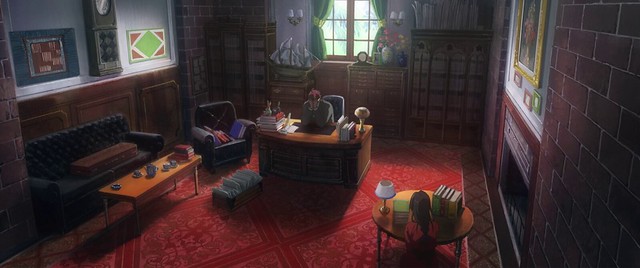
- While Claudia is openly disapproving of Dietfried, a conversation with Cattleya leads her to suggest that that both Violet and Dietfried are leaning on one another to handle their grief at Gilbert’s passing. Indeed, when Dietfried and Violet meet, Dietfried’s words to Violet suggest that he is sorry about what had happened and wishes to at least make amends with Violet – it had been on his suggestion that Violet was assigned to serve under Gilbert, and to Dietfried, he supposes that had he not made the call for this assignment, Gilbert might still be alive.

- Conversely, Violet believes that Gilbert’s death falls on her shoulders: in that fateful battle, she’d been unable to save him and was forced to leave him behind. Gilbert’s death weighs heavily on both Dietfried and Violet’s minds. The chance to converse with one another offers a brief bit of understanding for both, and while neither are changed by this conversation, both Violet and Dietfried are able to understand what Gilbert meant to one another more clearly. In particular, Dietfried had always regarded his younger brother coldly, and while he’d been arrogant and unfeeling as a soldier, after the war ended, the deaths of those around him fill him with remorse. A part of his concern for Violet comes from wishing she’d be able to be at peace with herself, too.

- When they were younger, Dietfried had express distain at the prospect of having to join the army, very nearly earning himself a physical beating from his father, a military hero and proud man who’d served the army. To defuse the situation, Gilbert offered to take up this responsibility instead to save his brother, and subsequently joined the army per his word, leaving Dietfried to become a renowned naval captain. It had been Dietfried who found Violet, but his old thirst for glory meant that he was unsure of how to best handle Violet. Dietfried’s competence and leadership notwithstanding, he’d spent the whole of Violet Evergarden a spiteful and proud individual.

- As such, Claudia does not exactly regard Dietfried warmly, but his actions in Violet Evergarden: The Movie indicate that he is trying to make amends for his past actions. Similarly, whereas Violet once saw Dietfried as a hostile individual, that she now gives him the benefit of the doubt and hears him out indicates that she’s also doing her best to live and let live. I believe that this film is set a year after the events of Violet Evergarden Side Story: Eternity and the Auto Memory Doll, which suggests that around three to four years have passed since the Great War of their time.

- Yuris and Violet finish their letters for his parents, and turn to the letter for his younger brother. Despite rebuking him earlier, it is not surprising that Yuris cares greatly for him, as well. Violet is able to deduce this, surprising him with how well she knows the feeling. With their letters done, Violet is introduced to the pinky promise: Yuris indicates that it’s a gesture with deep meaning, and Violet herself commits, promising to deliver the letters to his family. The practise’s origins are contested; in Japan, it’s known as the yubikiri (指切り, “finger cut-off”), and stems from the idea that failing to keep one’s word will result in the loss of one’s smallest digit. In North America, the practise is suggested as dating back to 1860 from a rhyme that suggests misfortune befalling those who cannot keep their promise. Whatever the origins are, it’s a gesture of trust, and with this, Violet demonstrates her commitment to whatever her word is.

- Violet Evergarden: The Movie progresses like the TV series does up until the moment Claudia and Benedict find an undelivered letter in their mail room. This is the disruption to the status quo that really sets the story in motion. In every work of fiction, an agent of change is what propels the narrative forward, and until this letter was found, Violet Evergarden: The Movie felt like another episode. However, with the revelation that Gilbert is potentially alive, the possibility to something much larger opens up. The first two fifths of the movie thus end up feeling a bit slower, but this pacing serves an important purpose: to establish how Violet and Dietfried have dealt with Gilbert’s absence in the past several years.

- Before informing Violet, who had been thinking about Gilbert every day since the war ended, Claudia decides to check things with Dietfried first. His reaction to the undelivered letter confirms that the handwriting is indeed that of Gilbert’s, and while his words many not show it, he also cares enough such that when Claudia makes a request of him, to investigate the mailing address on the letter, he is able to turn up something and passes it along back to Claudia. With concrete evidence that Gilbert is indeed alive Claudia lets Violet know of the news.

- When Violet learns that Gilbert living on a distant island known as Ekarte, her thoughts overwhelm her. She is unable to string a coherent sentence together and retreats to the rooftop overlooking Leiden. Previously, Violet had also come up here in Eternity and The Auto-Memory Doll with Taylor, after the latter had been inundated by her crash course in the fundamentals of literacy. Besides showing that Violet knows how to manage her stress, Violet Evergarden also takes the effort to show viewers that Violet cares for those around her, even if her body language and choice of words don’t always indicate this is the case.

- Shortly before Violet and Claudia head off to meet Gilbert on Ekarte, Violet suffers from nerves. A wave of questions pour from her, and she wonders if Gilbert is doing well, whether he would recognise her after all this time, and, whether not she’s ready to convey to Gilbert she returns his feelings. Violet’s doubts are yet another sign that she’s developed a great deal of agency, to be able to spot her own worries and desires. Cattleya reassures Violet it’ll be find, and that since the trip is going to take a few days, she’ll at least have some time to gather her thoughts and figure out what she ought to say first.
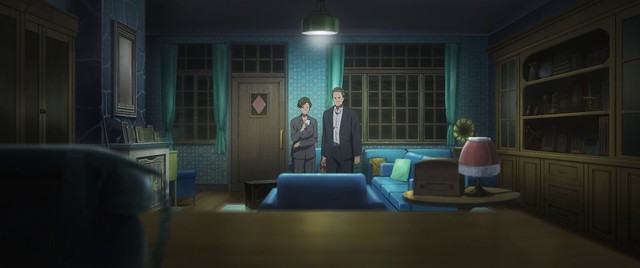
- Evan Call returns to score Violet Evergarden: The Movie‘s soundtrack, and with his finesse, creates a score that captures the full scope and scale of the emotional tenour within the film. The use of horns and strings create a compelling sense of warmth, and I imagine that this causes the mind to relax, with the gentle tones conveying an air of comfort and wistfulness. The use of music, in short, causes viewers to let their guard down and opens them up so that emotional moments in the movie are amplified tenfold. Knowing the essentials doesn’t mean the soundtrack is any less effective, and this is probably the reason why I always felt a stone’s throw away from tears throughout Violet Evergarden: The Movie.
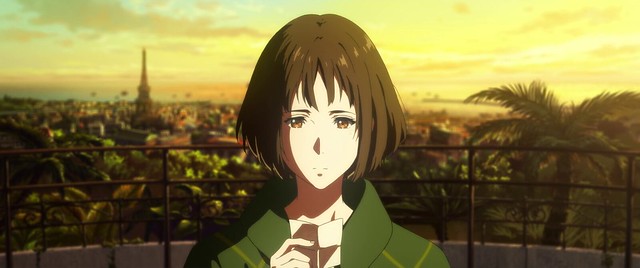
- As it was, I picked up the soundtrack a few weeks after the Japanese screenings began, and in what was a masterful bit of work from Call, the soundtrack betrayed nothing about the movie itself. The track names are all in English, and music often has a way of telling listeners an aural story that can lead some folks to guess at what’s happening in the movie, but here in Violet Evergarden: The Movie, the songs flush visuals from the mind and compel listeners to immerse themselves wholly in the sound of music. Compared to the anime, the film’s incidental pieces have a decidedly movie-like feel to them: everything sounds bigger.

- After finding Violet’s letters for her grandmother, Daisy is sufficiently moved that she ends up travelling to Leiden to learn more about the Auto-Memory Doll who’d transformed her grandmother’s world so dramatically. Upon arriving at CH Postal’s location, she finds that it’s been transformed into a museum detailing the modes of communication from a half-century earlier. However, the curator there was a former member of CH Postal and is happy to walk Daisy through things. Through conversation, Daisy comes to learn that Violet had stepped back from her duties one day after travelling to Ekarte.
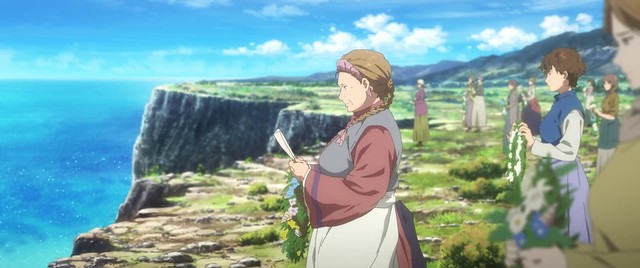
- Ekarte is a remote island located between Leidenschaftlich and the Galdarik Empire. Their proximity to Galdarik Empire meant that the island’s men were drafted to fight against Leidenschaftlich, and in the years after the war, the island’s demographics shifted to consist of only women, children and the elderly, as a large number of men perished in the fighting. The islander’s hymn to the ocean, originally to thank the ocean for its bounty and mercy, evolved into a memorial service, as well. The large cliffs here overlooking the ocean bring to mind the likes of the Cliffs of Moher in Ireland.

- It turns out that Gilbert had survived the war, and after his injuries were healed, he ended up travelling here to escape the horrors lingering from the war. He’s now a teacher, providing instruction to the youth on the island, and in his spare time, lends a hand to the people in their farming: Ekarte’s main crop appears to be grapes, and if I didn’t know better, I’d think the island was one large vineyard, supplying the grapes needed for winemaking elsewhere. The viewers’ first impressions of Ekarte is that the island is very peaceful, the perfect place to retreat to after a brutal and gruelling war.

- Weather has always played an integral role in Kyoto Animation’s productions, and Violet Evergarden: The Movie is no exception to this – Violet and Claudia’s journey to Ekarte is set under moody, overcast skies. Grey, cloudy days like these are almost always followed by rain in anime, which is used to set the atmosphere for dramatic moments. As it was, that this trip was taken on a cloudy day meant to me that meeting Gilbert would not be a straightforward matter of knocking on his front door and expecting him to invite Violet and Claudia inside for a spot of tea.

- The grey skies would also suggest cooler weather, which lacks the warmth and colour typically seen in Leiden. A long time ago, I detested overcast days and preferred it when sunshine allowed a land to showcase colours at its best. However, following my watching Sora no Woto, I came to appreciate the aesthetic that cloudy skies can bring. On the trip to Ekarte Island, Violet is a little pensive and restless, leading Claudia to suggest that she put her own thoughts to paper. This exercise helps to calm Violet, but on the deck of the ship taking them to Ekarte, a gust of wind strips Violet of her letter. The symbolism here is plain enough – carefully prepared words may fall apart, and some situations require that one play things by ear.

- Upon touching down at Ekarte, the islanders note that Violet and Claudia are unexpectedly polite and quite contrary to their impressions of Leidenschaftlich’s people: since the war had killed so many men from their island, the remaining residents saw Leidenschaftlich’s citizens as arrogant and callous monsters. However, seeing Claudia and Violet provide a concrete reminder that Leidenschaftlich’s citizens themselves didn’t wish for war any more than they did, nor were they directly responsible for the fact that Ekarte’s men never came back home. Ekarte’s residents thus treat Claudia and Violet with respect and help them with their search for Gilbert.

- Conversation with the islanders lead Violet and Claudia to a school, where class has ended for the day. After consideration, Claudia feels it might be easier on Gilbert if he were to meet him alone first – Violet had meant a great deal to Gilbert, and the shock of seeing her again after many years would also make things tricky for Violet. While Violet would like nothing more than to see Gilbert right away, she sets aside her own feelings, feeling that she’d waited this long to meet him, so a few more minutes wouldn’t hurt.
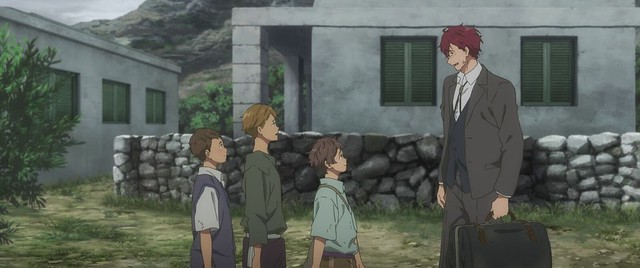
- After entering the school grounds, Claudia runs into several of Gilbert’s students. A brief conversation with them confirms that Gilbert is indeed here, and after they surprise him with a dead praying mantis, the students prepare to head home, leaving Claudia to have his first conversation with Gilbert in several years. The energy that these students convey, coupled with their neat appearance, shows that the standard of living on Ekarte isn’t bad, and moreover, that Gilbert’s been looking after his students well.

- Thus, when Violet runs into the same three boys, she smiles warmly after hearing their praises for him as a teacher; it is clear to her that Gilbert’s managed to find a new path in life following the war. Relief and joy is written all over her face here – this was one of my favourite moments in the whole of Violet Evergarden: The Movie, as Violet smiling is a particularly rare sight to behold.

- Encouraged by what she’s hearing, Violet becomes curious to know what kind of teacher Gilbert is, and the students are happy to oblige. For Violet, even simply knowing Gilbert is fine puts her heart at ease – Gilbert had disappeared without a trace, and for the longest time, Violet had no idea if Gilbert was even alive. Admittedly, as Violet Evergarden portrayed things, his fate was left ambiguous, and after he’d been heavily wounded, he ordered Violet to live on in his stead. One wonders if this ambiguity had been deliberate, planned from the start – had the series been direct about Gilbert’s fate, a movie would either be impossible or inevitable.

- In contrast with his student’s spirit and energy, Gilbert himself is less than pleased to meet with Claudia; his choice of words suggest that he’d long regretted what happened to Violet, and even now, Gilbert wonders if Violet would even face him after all of the sins he’d committed. However, for Claudia, Gilbert spares some time to explain how he’d survived and found his way to Ekarte Island. It turns out that after he lost consciousness, he was taken to a monastic hospital run by nuns – his dog tags had been destroyed (normally, they’d survive and allow for identification). While his injuries were great (Gilbert lost his right arm and eye), he managed to survive and recover.

- However, while the body might heal over time, wounds in the hearts do not close so easily. Consumed with grief and regret over the war, Gilbert ended up wandering about before deciding to travel a remote island, Ekarte. Because Gilbert is literate, he started writing letters for the island’s residents, and over time, ended up becoming a teacher of sorts. Gilbert came to believe that his greatest mistake was sending Violet into combat alongside the rest of his men, and as a result, caused her misery, as well. There is thus an interesting parallel: both Violet and Gilbert think of themselves as unworthy of the other, believing that they would only cause trouble for the other.

- Love, however, entails being able to care greatly for someone and strive for their happiness, in conjunction with accepting that one will occasionally hurt and be hurt by the other in some way, and in spite of this, accepting this to forge a path into the future together anyways. Both Violet and Gilbert are stubborn in their beliefs because they are unable to forgive themselves for what had happened. Consequently, the island of Ekarte becomes the perfect setting for this conflict to reach its resolution: the island itself represents the idea that Gilbert had closed himself from the world, and it takes someone from the outside (Violet) to help him to find his recovery.

- However, merely reaching the island is not enough, and by the time Violet decides she wants to meet Gilbert whether he wishes for it or not, he’s already headed home. Undeterred, Violet and Claudia head on over to his home, intent on having Gilbert at least give Violet a chance to speak with him for the first time in several years. The overcast skies give way to a heavy rainfall as the storm finally breaks and hits the island: Kyoto Animation’s stories always make extensive use of the weather to accentuate the tenour of a moment, removing any doubt as to what the moment was supposed to feel like.
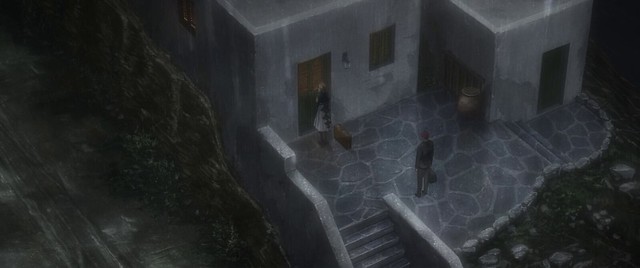
- In this regard, Kyoto Animation has never been subtle, and shortly after their arrival, both Violet and Claudia implore Gilbert to open up. While neither are able to convince Gilbert otherwise, with the door separating them, and hearing Violet’s voice, Gilbert begs Violet to leave – seeing Violet would be to remind himself of every failure he’d ever had, but Violet takes this to confirm that she had indeed caused Gilbert great pain. The parallels between how Gilbert and Violet feel are striking; both love one another enough to be willing to fully bear the burden of taking responsibility for what had happened, but in this moment, emotion overpowers rationality. Feeling the distance insurmountable, Violet runs off, only to fall into the muddy road.

- The play of lighting and water effects in this scene were phenomenal: the flow of rainwater through cracks in a dirt path, and rippling as they strike the saturated ground exhibits real-time reflections. I would imagine that Kyoto Animation utilised computer software to render this water effect – the results look as convincing as they would in some of the best games of today, and other studios, most notably, Comix Wave Films and Studio Ghibli, produce water effects that look quite different when they’re hand-drawn.

- As the storm rages, Claudia and Violet end up taking refuge in the lighthouse, where they are afforded some warmth and a chance to dry their clothes. Claudia reassures Violet they’ll try again the next day once the storm’s passed, and Violet suggests that if they do manage to succeed in seeing Gilbert face-to-face, she’d like nothing more than to punch his lights out. This moment speaks to the fact that Violet’s got a strong grasp of emotions now – even though she’s unhappy with Gilbert’s state and holds herself accountable, this joke subtle hints at the idea that she also holds him responsible for his actions here and now, as well as the fact that Violet herself is able to understand how to use humour to handle a difficult situation.
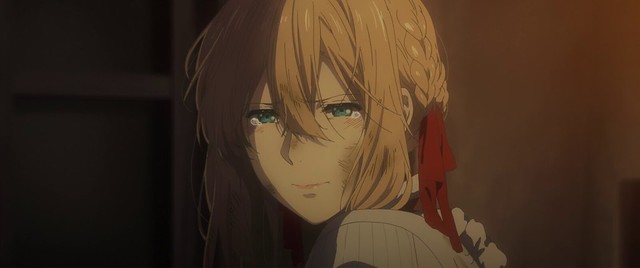
- However, things become trickier when the lighthouse operator receives a telegraph from a hospital back in Leiden – it turns out Yuris is dying, and because news of Gilbert had come so suddenly, Violet realises that she’d forgotten to help Yuris with one final request. Not wanting to see how frail he’d become, Yuris had angrily asked his best friend, Ryuka, not to see him at all, but Violet mentioned it took strength to see someone dear to oneself in such a state and suggests that Yuris make amends with Ryuka in the time he had left. With his death imminent, Yuris wished to reconcile with Ryuka, but Violet herself is now several days away, unable to return in time.

- Realising what this assignment had meant to Violet, Claudia sends back a reply, asking Iris and Benedict to do whatever it took to connect Yuris to Ryuka. In the end, it is determined that the new-fangled telephone would be their best bet: Iris fetches the device itself, while Benedict heads off to the operator with the aim of convincing him to link their telephone to Ryuka’s residence. This connection is successful, and for the first time since Yuris had asked Ryuka not to visit him, the two friends are able to speak.

- Speaking to how new the telephone is, Ryuka initially has trouble with the apparatus. The march of technology is inevitable, and details within Violet Evergarden: The Movie capture these nuances very well. Even for someone like myself, whose career is in technology, I’m still bewildered at how new programming languages, libraries, frameworks, SDKs and APIs continue to change the way things are done. The field is constantly evolving, and with it, the way people do things constantly shifts, as well. When the technology is in its infancy, even folks in tech have trouble with it – when Apple introduced Swift 2.0, I was completely frustrated with the idea of optional unwrapping, but these days, they’re an essential part of my work, and in fact, I feel that forced unwrapping is actually a poor practise, since it can result in crashes.

- Back in Violet Evergarden: The Movie, Yuris and Ryuka are able to connect; unlike letters, their voices convey precisely how they are feeling, and Yuris is able to apologise to Ryuka, who in turn replies that he was never angry with Yuris to begin with. Whereas Violet Evergarden had letters fulfilling this role previously, the telephone demonstrates its ability to carry ideas and feelings in a manner that is far swifter than any letter. This technology thus allows Yuris and Ryuka to reconcile their feelings, and subsequently, Yuris dies, knowing he’d been able to get his true feelings out to the most important people in his life.

- For Iris, watching this unfold would’ve been very difficult; being with a family as they watch their son die was hard enough on her, and she did what she can to help Yuris and his family in Violet’s place, but having spent the film with a kind of bravado about doing her best despite knowing her occupation’s twilight had come, Iris realises here that the technology she had doubted was actually capable of doing the very thing she’d long held to be limited to the realm of letters. Aside from telephones, the telegraph also begins rising to prominence by the events of Violet Evergarden: The Movie; utilising radio waves, it is able to send messages over great distances at haste.

- I imagine that in Violet Evergarden, they’re probably using some form of Morse Code, adapted for their own alphabet – closeups of letters find that Kyoto Animation had gone to the lengths of creating a constructed written language for the series utilising Tamil as the basis for phonology. Thanks to voice-overs, viewers can spot patterns in the letters and associate the characters with meaning (similarly to how Alan Turing’s team of codebreakers cracked Enigma after determining that all Nazi messages ended by addressing the Führer), and since patterns can be spotted in the letters, it becomes clear that, while the written language in Violet Evergarden is not as sophisticated as Quenya or Sindarin, an impressive level of work went into making the language realistic.

- Since there is a finite set of characters, it stands to reason that whatever equivalent of Morse in Violet Evergarden is similar to its real world counterpart, allowing for swift communications. The telegraph thus lets Violet learn that her coworkers have managed to help Yuris out to the best of their ability: with no more regrets or lingering thoughts troubling him, Yuris dies peacefully surrounded by those who love him greatly. Yuris’ parents are greatly saddened by his death, but also find solace in learning that he’d appreciated them greatly for everything they’d done for him. For his younger brother, Yuris expresses the wish that he will live life fully and bring his parents joy where he could not.
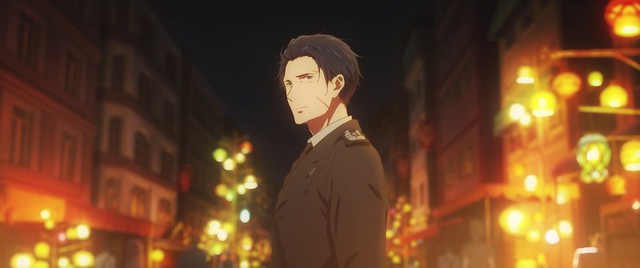
- With Yuris’ story ending, Violet Evergarden: The Movie returns focus to the main storyline – Yuris prima facie feels secondary to the central, as did Daisy’s story, but their inclusion serves an important purpose in giving context to Violet’s character. Yuris provides an instance of how far Violet has come since her first days at CH Postal, and Daisy indicates how Violet’s letters continue to have an impact even long after Violet’s era has passed. In other words, these secondary stories show that by this point in time, Violet’s got the empathy to understand others and is finally ready to deal with her toughest assignment: herself.

- In the end, Violet is relieved to know that she’d completed her assignment successfully – Yuris passes on, at peace with having been able to properly express himself for his family. Her smile stands in contrast with her woebegone appearance, a consequence of having tripped earlier. I imagine that, seeing the power letters still hold in their ability to convey emotions and thoughts where spoken language is inadequate, Violet decides that it’s time to write another letter to Gilbert; she decides that it’s fine if Gilbert won’t meet her, and that her experiences with letters have found that through words, she might be able to convey her feelings to him despite his reluctance to meet.

- From the largest landscapes to the dewdrops glistening on individual blades of grass, Kyoto Animation’s care towards bringing every scene to life is apparent in this film. After the tragedy that struck their studio two years earlier, an outpouring of domestic and international support allowed the studio to continue operating, and it was decided to continue running a training programme for prospective animators. While some of Kyoto Animation’s works were delayed, ultimately, the act of unspeakable evil did not prevail, and the studio continues to demonstrate that their staff are ready to continue on with their exceptional work.

- This shot of Ekarte Island reiterates to the idea that the island is a peaceful sanctuary far removed from the worries of the world, and seeing the inhabitant’s livelihoods does hint to viewers that for Gilbert, having a quiet home removed from the world’s troubles is something he definitely needed. The idea of tragedy sending people to remote places to re-evaluate their outlooks is not new, and one of my favourite examples is Jet Li’s Fearless, where Huo Yuanjia is portrayed as wandering the countryside after losing his family to his arrogance, and after he reaches a village, learns humility and compassion there. When Yuanjia returns to Tianjin years later a changed man, he apologises to those whom he had wronged and makes amends, before fighting to defend the integrity of Chinese martial arts.

- However, while the intention of using journeys begins the same, Violet Evergarden: The Movie and Fearless are radically different, each with their own merits. Back in this film, as the day draws to a close, Violet is finally ready to send her letter to Gilbert. Gilbert, meanwhile, had been helping the islanders with a small gondola system that makes it easier to transport grapes up the mountain. Even in a place as remote as Ekarte, technological progress is inevitable, showing humanity’s inextinguishable spirit for progress and improvement.
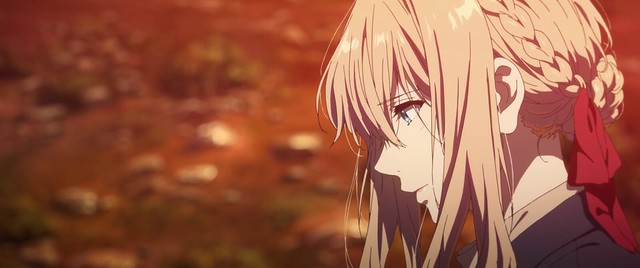
- Violet is doubtlessly disappointed that did not have a chance to see Gilbert in person and express her feelings properly, but the knowledge that he’s alive and well, coupled with the fact that she is able to at least leave a letter, means that Violet is okay with heading back to Leiden and resuming her duties. At least, this is what Violet tells herself, and in reality, people often set aside their own desires to pursue a more practical path. There is no right or wrong way to approach this, and for me, what matters is whether or not one is able to take ownership of their choices.

- At the bottom of the hill, near the ocean’s edge, Gilbert resigns himself to the fact that it’s probably better if he didn’t meet with Violet as the sun casts the land in the glow of a dying day. In Kyoto Animation’s works, evenings always signify an ending of sorts, the conclusion of one chapter in preparation for the next chapter’s beginning. Under the oranges and reds of twilight, characters are most honest with themselves as the light begins fading, and in this way, evenings come to represent the time where runway runs out. Kyoto Animation shows that it is when people realise that the end is near, they tend to be the most truthful about how they feel. Ryōko Asakura confronts Kyon during the evening during The Melancholy of Haruhi Suzumiya, signifying the close of one milestone.
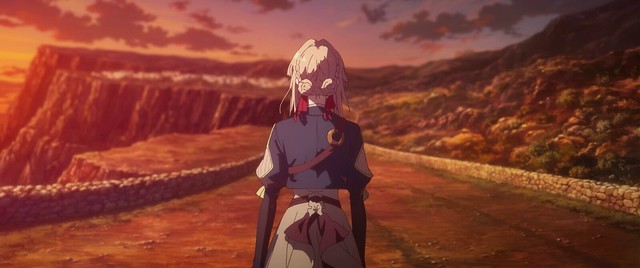
- In CLANNAD and Kanon, different evening palettes similarly would show viewers whether or not the ending of a particular arc was meant to be rising action or falling action. Particularly sharp colours and hues of red indicate something is amiss (during the aforementioned scene in The Melancholy of Haruhi Suzumiya and when Misae realises that the Katsuki she knows had died some years prior to his meeting her), whereas oranges and golds (such as during Tomoya’s kokuhaku to Nagisa, or in K-On!! following Yui and the others’ final concert) suggest a warmer ending. In Violet Evergarden: The Movie, the evening colours tend towards the former, with intense shades of orange hinting to viewers that things still need resolution.
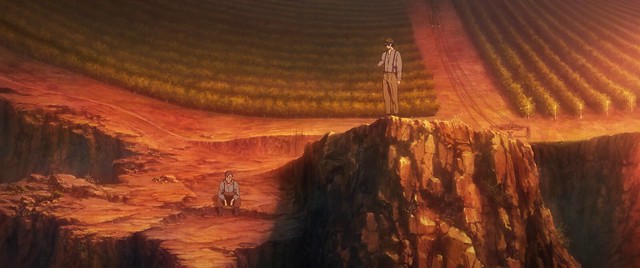
- While looking over the sea, Gilbert hears from an older man, whose words speak volumes to what the islanders believe in: although horrific things happened during the war, war treats its participants all the same. Ultimately, the islanders bear no grudge towards Leidenschaftlich’s people, since the brutality of war likely meant that a Leidenschaftlich similarly would’ve experienced what they did in terms of loss. The islanders therefore have forgiven Leidenschaftlich for the war and are moving on, but Gilbert is unable to forgive himself.

- This is ultimately the impediment that keeps him from wanting to see Violet. While Gilbert’s stubborn insistence on leaving Violet be might seem foolish, Kyoto Animation takes the effort to show why characters make the decisions that they do. In a work of this level, the characters’ actions and decisions are backed by more than just their dialogue and internal thoughts: metaphors in their setting and visual elements like lighting also speak to how an individual is feeling. In Violet Evergarden: The Movie, environmental factors like weather and time of day speak largely to Gilbert and Violet’s emotions.

- Dietfried, long considered a detestable character, finds his redemption in Violet Evergarden: The Movie when he shows up on Ekarte and apologises to Gilbert for foisting upon him a burden that Dietfried was originally responsible for. Being able to speak to Violet and understand what Violet meant to those around her leads Dietfried to an epiphany of sorts: Dietfried promises to uphold the Bougainvillea name and take on the duties Gilbert once shouldered, assuring Gilbert that the time has come for him to live on his own terms.

- When Violet’s letter arrives on the very gondola he’d helped to build, Dietfried presses Gilbert to open the letter Violet had written for him. In this letter, Violet expresses gratitude to him: while it is true Violet had gone through very tough times even though she’d been in his care, Violet had nothing but appreciation for him. Seeing her feelings put into words is what turns Gilbert around:
Dear Major Gilbert,
Please forgive me for my sudden intrusion. This is the final letter I’ll write to you. The reason why I’m alive, and are able to think of others fondly, is all thanks to you. Thank you very much for taking me in, for reading books to me, and teaching me the alphabet. Thank you very much for buying the brooch for me. Thank you very much for always being by my side. Thank you for loving me. Because you said you loved me, those words became my way of life. Ever since I found out what love is, I’ve wanted to say those words back to you.
Major Gilbert, thank you very much for everything.
Violet Evergarden

- Dietfried expresses the thought that was on my mind all film: that it incredibly hard for people to be truthful to others about how they feel. This is ultimately the basis for all love: being able to be sincere and honest about one’s feelings rather than holding them in, and trusting those around oneself. Dietfried realises this, and at long last, Gilbert finally decides the time has come to follow his heart. In doing this, Dietfried redeems himself: while Violet had suffered under him, she found solace with Gilbert, and giving Gilbert the push he needed to reunite with Violet is his way of making amends. No longer bound by his past, Gilbert rushes off for the pier, hoping to catch Violet before she’d left. Even after the boat departs, Violet hears Gilbert’s anguished shouts, and she jumps overboard.

- Against all the odds, Violet and Gilbert are able to meet one another properly without doubts or regrets separating them. In moments like these, neither Violet nor Gilbert can find the words to express to one another how they feel. While the sun has set, indicating the end of one window, moonrise brings with it a new light, illuminating in the land with a gentle radiance. Kyoto Animation’s symbolism is spot on – just because one chapter has passed doesn’t mean things are over, and there is always new beauty that arises in the world. It is therefore unsurprising that it is here that Violet and Gilbert meet.

- It is not without irony that Violet, despite having come so far in her understanding of human emotions and having attained a mastery of language that are the envy of manny, is reduced to a blubbering mess here. Some experiences and moments simply are beyond words, and all Violet can do is stammer out how happy she is to see Gilbert, who similarly is unable to express himself coherently. Kyoto Animation’s presentation here shows how love isn’t always the elegant declaration that fiction make it out to be, but even then, the feelings are genuine and sincere.

- A tearful embrace therefore speaks volumes about the outcome; Violet Evergarden: The Movie‘s climax is here, the culmination of years of progress for Violet, and a lengthy three-year journey for fans of the series. Considering what it had cost to get here, I count the outcome to meet expectations – both Violet and Gilbert have experienced so much that it would stand completely contrary to the film (and series’) messages were they to go their separate ways. I appreciate that this sort of outcome only rarely happens in reality (love is fickle and desperately tricky to get right), but for the sake of a story, having a meaningful, worthwhile theme matters more than realism.
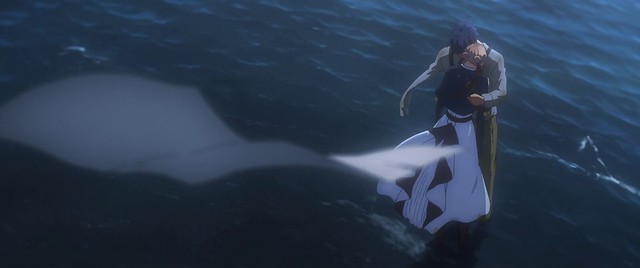
- Signifying the end of the chapter, Gilbert lets go of the letter Violet had written for him – the pair now have their futures ahead of them, and the letter is a visceral, tangible piece of the past, one that is no longer relevant to either of them. Knowing that both Gilbert and Violet have found their footing at last sets a feeling of relief in viewers: the story chooses to offer the long-suffering couple a modicum of privacy, rather similarly to how Daniel Handler had opted to not record the quiet moment that Violet Baudelaire and Quigley Quagmire had shared while climbing the frozen waterfall in The Slippery Slope. Readers took this to mean Violet and Quigley express their feelings for one another here, so assuming this to hold true, Violet Evergarden: The Movie would similarly indicate that Gilbert and Violet do live happily ever after to the end of their days, as Bilbo had hoped after relinquishing the One Ring before his journey to Rivendell.

- Claudia returns to Lieden, just in time to join Cattleya and the rest of CH Postal’s staff for a fireworks show unveiling the completion of the city’s new radio tower. This tower looks decidedly like the Eiffel Tower – the original Eiffel Tower had originally been constructed as a part of the 1889 Expo and was indeed use as a transmission tower for FM radio. When the permit for the tower expired in 1909, plans to dismantle the tower were abandoned owing to its valuable service, and today, the Eiffel Tower remains an iconic part of the Paris skyline. This final fireworks show in Violet Evergarden: The Movie serves as a finale of sorts for Violet’s era, bringing it to a definitive close.

- It is no secret that I’ve enjoyed the movie thoroughly, and numerous others have similarly done so. Even Anime News Network provides a review that calls the movie “a fantastic film… [that] is an emotional experience with a deep insight into the human condition”; their reviewer only holds against the movie that it “can be hard to see the beauty on screen through all the tears”. Anime News Network may strike out with some of their reviews, but this is not one of those times, speaking to the incredible quality of writing within Violet Evergarden: The Movie. Anime News network did have another review for the film; it turns out that five and a half months earlier, another reviewer had travelled to Japan to watch the film shortly after it premièred in Japan.

- This reviewer felt that Violet Evergarden: The Movie had a “heavy-handed approach to emotions” resulting in “the Violet and Gilbert plot [falling] flat” that ultimately resulted in “a messy experience overall”. This time around, I’m glad the reviewer left their textbook for gender roles and normative behaviours in 19th century Europe at the door to focus purely on their experiences with the movie. While the review suggests Violet Evergarden: The Movie tries a little too hard with their delivery of emotions, the reviewer also praises the technical excellence and indicates that they also had a passable experience overall. It was interesting to finally read a critical review from ANN that was actually fair and focused on their experiences over suggesting the lack of social relevance was to the work’s detriment.

- That Violet Evergarden: The Movie was able capture the power of language and convey it even to some of the internet’s harshest critics, as well as finding ways of impressing particularly cynical viewers with its phenomenal visuals, speaks volumes to how well done the movie is. Violet Evergarden: The Movie ended up being an experience that, were the option available to me, I would consider travelling to Japan for the express purpose of watching the film. Were that to be the case, I’d probably just indicate that I was sightseeing at customs, and then take advantage of that to explore other parts of Japan (say, Yamanashi or Izu).

- Since such a trip isn’t in the realm of possibility, at least for the present, I remain content to kick back in my favourite chair and watch the movie from the comfort of home. After the fireworks concludes in Violet Evergarden: The Movie, the story returns to Daisy, who learns that Violet ended up travelling to Ekarte Island. In retracing Violet’s steps, Daisy connects a little more with her grandmother, whose life was changed after Violet had written her those letters. The Ekarte of Daisy’s time doesn’t look like it’s changed too much from when Violet first arrived, and the people seem friendly enough.

- As Daisy travels further into Ekarte, the islanders’ livelihoods look solid, and the people have flourished: she might be visiting during the winter on a cold, overcast, day, but the bright lighting suggests that the moment is peaceful. While Violet and Gilbert might no longer be around, they’ve left a tangible legacy on Ekarte. One imagines that the two would’ve run the school together, teaching students how to read and write to better prepare them for the demands of a changing world. While some of the students would leave the island to pursue their careers, a handful of people also chose to remain behind and keep the island’s services running.

- This is best shown when Daisy stops by a local post office and learns that Ekarte had a very large number of letters bearing stamps from CH Postal; the officer running the post office is well aware of Violet’s legacy, indicating that after Violet moved to Ekarte, she continued to help people out in her own way. Having Daisy’s story within Violet Evergarden: The Movie thus becomes clear – the story was intended to implicitly present Violet and Gilbert’s ultimate fate. Ambiguity is used in Violet Evergarden to enhance the story’s impact –seeing Violet and Gilbert together would’ve diminished the mystery and provide a definitive ending, but showing the legacy the pair leave behind, and the fact they are remembered five decades later allows the film to really show just how much good Violet did for the world.

- Violet had been quite confused by Yuris’ use of the thumbs-up gesture, but after understanding it to mean a sign of approval, came to appreciate that there was a plethora of ways of expressing happiness and agreement. I imagine that Violet Evergarden: The Movie meant to show that Violet’s impact on Ekarte is not trivial with this gesture, although I note that thumbs up have existed since the Roman Empire, and in the Middle Ages, was taken to mean “ready”. One might imagine that on Ekarte, the men leaving meant that the gesture was forgotten over time, and with Violet’s arrival, the notion of thumbs up returned to the island.

- Despite the advent of the telephone and telegraph, Daisy thus realises that letters can still hold their power in telling a specific set of feelings where spoken words might be too tricky to wield. At a quiet café, she sets about writing a letter to her parents, thanking them for being there for her despite being so busy all the time. The courier delivering the letter is riding what looks like a Super Cub, although at this distance, it is quite difficult to tell. With this, the largest post I’ve written for 2021 comes to a close (final word count: 12762). It should go without saying that I enjoyed this movie enough to give it an A+, a 4.0 of 4.0 (or ten of ten), a strong recommendation (albeit one that requires a priori experience with the TV series).
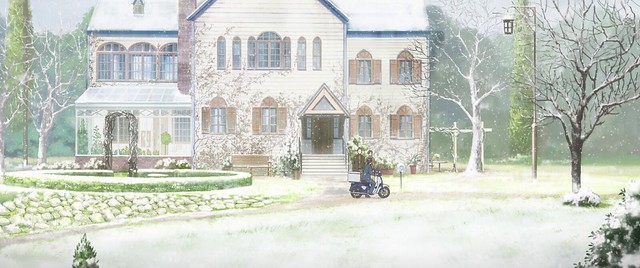
- I am glad to have had the Heritage Day long weekend to write about this movie – towards the end of the long weekend, the skies darkened and the air cooled, offering relief from the hot and muggy weather that dominated July. Besides an eleven kilometre walk under overcast, drizzling skies, I also had the chance to get further into DOOM: Eternal, and I finally set foot on Northrend in World of Warcraft. In addition, I’ve finally had the chance to hit the optometrist after two years of not going (being busy in 2019, and then last year, everything was closed) and get a haircut. A delicious homemade sirloin steak dinner rounded out the long weekend, and now, I’m ready to take on August.

- Kyoto Animation pulls an MCU in Violet Evergarden: The Movie – after TRUE’s “Will” and “For people in the future” plays (both are excellent songs I cried to) play over the credits, there’s a post-credit scene of Violet and Gilbert sharing a pinky-promise. This simple gesture speaks volumes about their future, and after such a route to get here, the two have definitely earned their happily ever after, to the end of their days, several times over. Violet Evergarden: The Movie is an immensely satisfying conclusion to the series, and because this film is an essential experience for everyone who enjoyed Violet Evergarden, I hope that everyone who wishes to see this film will have the chance to do so.
Whole-movie reflection and closing remarks
With the grand finale to Violet Evergarden in the books, it is evident that Kyoto Animation has not only met, but surpassed expectations in their production of Violet Evergarden: The Movie. This film is a technical and thematic triumph, demonstrating that despite the tragedy that struck their studio two years earlier, the staff were able to overcome this adversity and produce a work that speaks to their values and virtues. The love and dedication Kyoto Animation’s staff demonstrate towards their craft is evident within Violet Evergarden: The Movie; every scene is crafted with an eye for detail, and the final product is a powerhouse of a performance. Kyoto Animation thus demonstrates that creativity and the human spirit can and will endure, even in the face of senseless acts of ignorance and violence. It is therefore encouraging to see Kyoto Animation continue on in their work, for their fans, themselves and those who were lost that day – Violet Evergarden: The Movie demonstrates that living well is the best revenge, and their conclusion to Violet Evergarden indicates the studio remains as resolute as ever to push the limits of creativity. As I saw it, Violet Evergarden: The Movie is the culmination of experience and devotion, combining story and character development together with superior visuals and sound to tell a compelling, emotionally-impactful tale of love, forgiveness and keeping an eye on the future. I thoroughly enjoyed Violet Evergarden: The Movie for tying in the strongest elements from the anime and bringing closure to the element that had doubtlessly lingered on viewers’ minds; being able to see Violet finally meet Gilbert brought with it a sense of catharsis and closure. Violet’s transformation from an emotionless killing machine to a sensitive and gentle individual intent on helping others while pursuing her own journey. By Violet Evergarden: The Movie, Violet’s come far enough to have her own agency, showing that she’s now ready to help herself to pursue the future she’d desired. The film is a send-off for the Violet Evergarden series as much as it is Kyoto Animation’s way of telling the world that they’re still here, and still making memorable, exceptional anime. Violet Evergarden: The Movie is a fitting conclusion that decisively wraps up the franchise, being the end point of Violet’s journey towards understanding love, and having already accomplished this with resounding success, the remaining elements within the film serve to remind viewers that Kyoto Animation’s craft is unparalleled. I therefore look forwards to seeing what lies ahead for Kyoto Animation; they’ve unequivocally shown their viewers they care very much, and this shows in all of their productions. Violet Evergarden: The Movie is no exception, and in fact, reinforces the idea that adversity is not going to stop Kyoto Animation, a studio that is always ready to go the extra mile for their fans.
























































































“…Yuris, who is afflicted with a terminal illness. His family clearly loves him, but he’s grown weary of their concern for him and wishes that with the time he has left, they’d treat him normally.”
A subplot in the mystery novel Pale Gray for Guilt (1968) by John D. MacDonald was protagonist Travis McGee’s current lady-friend Puss Killian, who after being with him for most of the book, abruptly vanished. In the final chapter, she sent McGee a letter revealing she’d been in a somewhat similar case to Yuris: diagnosed with a brain tumor, and troubled by how all of her family, perhaps especially her husband, had figuratively tiptoed around her. “So life became like a practice funeral, with too many of our friends knowing it and everybody trying to be so bloody sweet and compassionate during a long farewell party.”
Running away from that lovingly-intended torment, she hooked up with McGee. Then his friend Meyer, discussing philosophy with her, unwittingly convinced Puss it was her duty to go back to husband and kin so they could find some sort of closure. Her letter also mentioned that she was soon to go under surgery, and the prognosis wasn’t enormously hopeful.
A subplot in the final Travis McGee book, The Lonely Silver Rain (1985), brought out that McGee still kept the letter from Puss in his safe-deposit box. It was quoted, in its entirety, word for heartbreaking word.
That memory hit me when you described Yuris’ situation.
LikeLike
The commonalities between something like Violet Evergarden and Pale Gray for Guilt is a constant reminder that irrespective of culture, tradition or creed, there are always universality about human emotions that can be understood. It is immensely painful to know one’s time is limited and then strike that balance between helping them to make the most of what’s left while being respectful of their condition, but on the flipside, there is also that catharsis that for some folks, passing on in peace and being released of their suffering is also a blessing, speaking to the level of effort that went into making Violet Evergarden: The Movie as hard-hitting as works as Pale Gray for Guilt or The Lonely Silver Rain.
LikeLike
Pingback: The September JCS (Or My Clumsy attempt to celebrate bloggers) – In Search of Number Nine — An anime blog